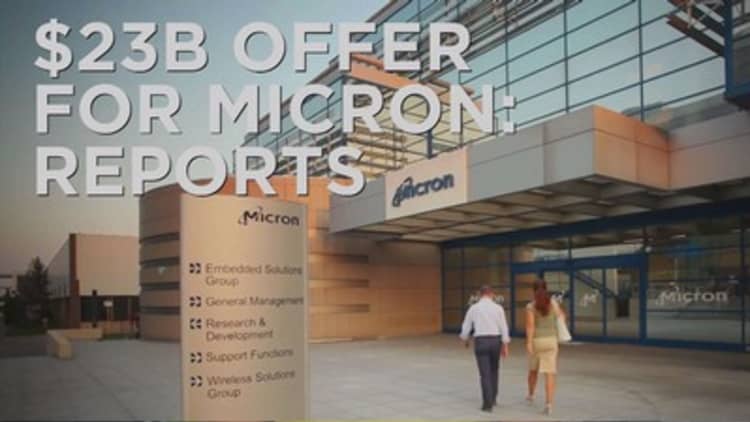


China's Tsinghua Unigroup may be making an opportunistic grab for the last U.S. memory chip maker, but the Chinese bidder for Micron is unlikely to gain U.S. approval.
The real significance may be that Tsinghua's bid put Micron Technology in play for another buyer, say analysts. Even if so, the list of purchasers would be short, considering its niche and size.
The Wall Street Journal reported Tuesday that Tsinghua Unigroup, China's largest chip design firm, has prepared a $21 per share or $23 billion offer for Micron. The newspaper quoted a source saying Tsinghua presented the bid to Micron management, but Micron was quoted as saying it had not received an offer and it had no further comment.
The bid, if made public, would be the biggest by a Chinese company and would be subject to U.S. review, including before the Treasury Department's Committee on Foreign Investment in the U.S.
"I think they're going to have a really hard time. CFIUS is always suspicious of state-owned enterprises. That would be a huge obstacle," said James Lewis, a security expert with the Center for Strategic and International Studies.
"The second one is DOD (Department of Defense) has always been uncomfortable with technology transfers to China's microelectronics industry. It's not like the Chinese have done us any favors recently. I think what's a factor is U.S. companies are being treated unfairly in China."
The Asian country has been eager to build a memory business, the chips used both in servers and in the fast-growing mobile business, say analysts.
Read More
"I think it's highly unlikely the Justice Department would allow this," said Timothy Arcuri, an analyst at Cowen. "DRAM is in a lot of security-related applications. It's in defense-related stuff. It's in enterprise server applications that are storing very sensitive information. Also, it's the last remaining domestic DRAM producer, and I think right off the bat, there would be a lot of hurdles from a regulatory point of view."
The Chinese company has stepped in at an opportune time, with Micron's shares about a third cheaper than several months ago. Micron was up 12 percent to $19.73 in late trading Tuesday.
"The stock was at $30 six or seven months ago. It was at $24 literally three weeks ago, so to have the Chinese come in, this is a wholly opportunistic thing. They're saying: 'The market's hammered the stock. This is an asset we want. If we get this through, it would be a home run for us,'" said Arcuri. "I would think if this thing is in play, Intel would be involved. I would also think some of the U.S. private equity firms would be wise to look at it as well."
Read MoreTsinghua prepares bid for Micron
Intel did not respond to requests for comment. But analysts said that it may be out of the running for a number of reasons, not least of which being that it is currently in the process of buying Altera for $17 billion.
Mario Gabelli, CEO of Gabelli Asset Management, said that the bid was cheap but it is unlikely the government would permit it under CFIUS.
Cowen's Arcuri also said the reported Tsuinghua offer of $21 per share is too low.
"It's $18 to $19 a share just to build out what they have in terms of installed capacity for DRAM and NAND, not to mention the partnerships," Arcuri said. He said Micron has a partnership with Intel, which owns a 20 percent stake in Tsinghua. Micron also has a partnership with Taiwan's Inotera, which produces DRAM. That venture could be threatened by a Chinese owner of Micron, he said.
David Einhorn, whose $12 billion Greenlight Capital holds a stake in Micron, said in an investor letter Monday, before news of the offer, that Micron would be worth more than Netflix in the next few years. He noted that semiconductor technology was a bright spot. Micron's market cap is about half that of Netflix. (Greenlight did not immediately respond to a request for comment.)
Hendi Susanto, technology analyst at Gamco, said private equity is a possible buyer for Micron, but it would need to be a special buyer that understands the DRAM business.
"Overall I do think it has a limited number of potential buyers, considering the size ... and the fact memory is an oligopoly, where you have to compete against Samsung," he said.


